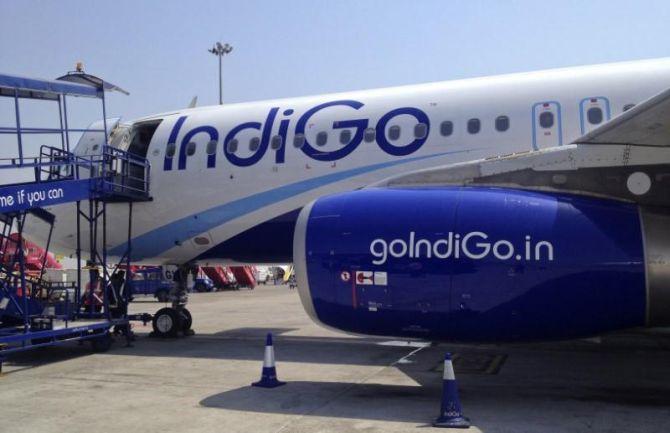Shares of low-cost airline IndiGo hit record high on the bourses soon after reports of pilot crisis at Vistara emerged.

The development also saw airfares surge by around 25 per cent on select routes.
Shares of IndiGo hit a lifetime high of ~3,68.5 on April 2, 2024, and has gained 2.4 per cent on the bourses in April.
While the benchmark S&P BSE Sensex has risen 1.4 per cent during the period.
While Vistara has decided to curtail flight operations, reports suggest that the airline is working towards returning to normalcy. Going ahead, analysts believe the near-term outlook for IndiGo — which is owned and operated by InterGlobe Aviation — remains slightly cautious as the situation is developing.
“Air fares have already jumped this month, likely benefitting IndiGo.
"Any further increase in ticket price may see capping action from the regulatory watchdog,” cautioned Gaurang Shah, senior vice-president, Geojit Financial Services.
G Chokkalingam, head of research at Equinomics Research, however, points out that incremental benefits from the crisis at Tata-owned airline, if any, may be outweighed by risks from surging oil prices.
“Besides, IndiGo commands a dominant market share in the industry and the incremental benefits from the Vistara crisis may not be significant for the low-cost carrier,” he said.
Data by Directorate General of Civil Aviation (DGCA) showed that IndiGo commanded a market share of 60.1 per cent as of February 2024, while Vistara had a share of 9.9 per cent and Air India 12.8 per cent.
Brent crude oil, meanwhile, is testing the $91 per barrel-mark at present, having risen 10.4 per cent in a month.
So far in calendar year 2024 (CY24), oil prices have jumped nearly 18 per cent.
Industry analysis suggests nearly half of Indian airlines’ operating expenses are attributed to jet fuel, thereby making them significantly sensitive to such fluctuations.
For IndiGo, aircraft fuel expenses accounted for 41 per cent of total expenses at the end of the December 2023 quarter (Q3FY24).
This was higher than 38 per cent at the end of the September quarter.
Surging oil prices, according to Shah of Geojit, could hit the airline if the government decides to hike the prices of aviation turbine fuel (ATF).
The last time ATF price was hiked was on March 1, 2024 when the Centre jacked up jet fuel prices in the national capital to Rs 1,01,396.54 per kilolitre (kl) from Rs 1,00,772.17 lakh.
Against this backdrop, analysts suggest investors partially book profit in IndiGo, while new investors may wait for a decent correction to add the stock from a long-term perspective.
Analysts at Kotak Institutional Equities believe IndiGo is big enough to chart its own growth trajectory over long-term, unperturbed by externalities.
“IndiGo has guided for an improved pricing outlook for Q4FY24, up on a yearly basis versus the earlier flat year-on-year (Y-o-Y) guidance.
"Its low double-digit available seat kilometer (ASK) growth guidance for FY25 is comforting,” the brokerage said in a recent report.
It has a ‘buy’ rating on the counter and a target price of Rs 4,300.
Meanwhile, the airline plans to add at least one new aircraft a week in FY25; add 10 new destinations and raise employee count by 5,500-6,000.
It also aims to shift the capacity mix towards international travel.
“Despite factoring in higher crude prices and pilot salaries, our estimates are flat to higher, driven by better ASK growth and yields.
"We continue to see upside risks to our yields in near-term and capacity/demand growth and profitability over the medium-term,” said analysts at UBS.
They maintain a ‘buy’ rating on the stock with a target price of Rs 4,000.
Disclaimer: This article is meant for information purposes only. This article and information do not constitute a distribution, an endorsement, an investment advice, an offer to buy or sell or the solicitation of an offer to buy or sell any securities/schemes or any other financial products/investment products mentioned in this article to influence the opinion or behaviour of the investors/recipients.
Any use of the information/any investment and investment related decisions of the investors/recipients are at their sole discretion and risk. Any advice herein is made on a general basis and does not take into account the specific investment objectives of the specific person or group of persons. Opinions expressed herein are subject to change without notice.













 © 2025
© 2025